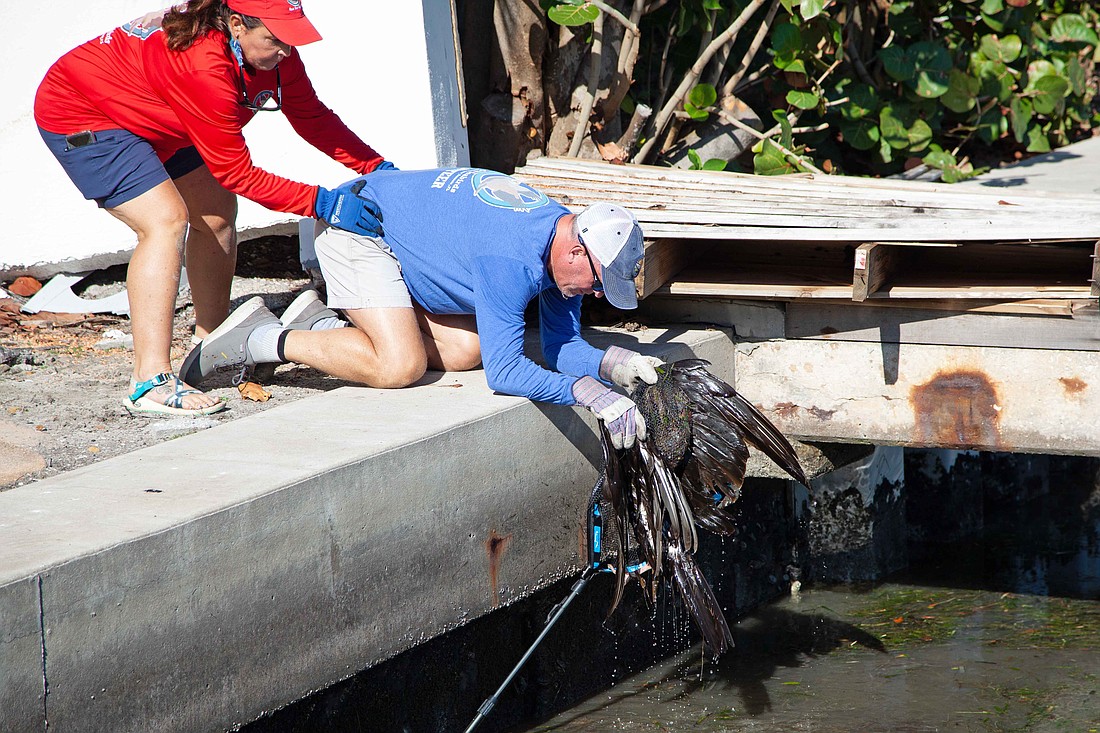- May 10, 2024
-
-
Loading

Loading

All Heather Sellers said was “my husband likes birds,” and a week later, she and her bird-loving husband, Ray, were chasing a royal tern a half-mile down the beach on their first rescue mission for Save Our Seabirds.
First, they had to Google what a royal tern looked like, but right after that, they were on their way to save the bird with, what Sellers called, an “Elvis head.” Royal terns have black crown feathers that often stand up like a pompadour hairstyle.
Ray’s fondness for birds didn’t come with any special avian expertise. The Sellers are semi-retired after 35 years in the restaurant industry. They live in Windward Bay.

Sellers, 54, was already volunteering for Longboat Key Turtle Watch. President and vice-president, Tim Thurman and Cyndi Seamon, also volunteer for SOS. When Sellers told them Ray likes birds, the wheels were not just set in motion, they were accelerated to turbo mode.
“They’re like, ‘Oh, he does?’” Sellers said, “And by the time I got off (turtle) patrol, there was a little pet crate next to my husband’s truck.”
When Ray called to ask if Heather knew anything about the cage, she explained how she unwittingly volunteered them to be bird rescuers. Within hours, they’d already received an email from SOS instructing them on how to become volunteers.
This was in September 2020; the COVID-19 pandemic left SOS operating with a bare-bones crew of staff members and volunteers. They couldn’t conduct normal training sessions, but they needed any help they could get.
The Sellers have since rescued more than 200 birds on Longboat Key. They averaged one every three days during the worst of the pandemic.

That first rescue call came from the Longboat Key Club. It was pouring rain and their equipment consisted of the pet crate, a small net from their boat and a towel.
“We got out on the beach, and the first thing we saw was a colony of terns and a colony of gulls, so hundred of birds,” Sellers said laughing. “We looked at each other like how are we going to be able to find the one that needs help. And suddenly as we looked across, we saw one that looked like its beak was caught in his neck.”
The tern's neck was wrapped in fishing line, but that didn’t make him cooperative. He flew away four times and led them a half a mile down the beach. The Sellers were about to give up until some other birds started pecking at him. The tern gave up instead; they secured him with the towel and brought him to SOS for further help.
With no experience, fancy equipment or official training, the Sellers were guided via telephone by SOS senior avian hospital technician Jonathan Hande.
“Jonathan was amazing to us. He gave us guidance as we went out on each run,” Sellers said. “We literally fell into this and have just been amazed by the center ever since.”
SOS treated 944 area birds in 2022, and over 90% of the birds were brought in by rescue volunteers. The rest are dropped off by citizens or police, sometimes during business hours and sometimes left at the facility’s after hours intake box.
“I don’t think we’re in business very long if we don’t have rescue volunteers,” Save Our Seabirds CEO Aaron Virgin said. “ Our staff doesn’t rescue birds. Our volunteers do.”
As volunteers, the Sellers have walked countless miles, climbed trees and scratched their legs on oyster beds in pursuit of birds needing rescue.

“As my husband always says, you look at the bird, and once you lock eyes with it, there’s no way you can’t help it,” Sellers said. “You’ve got to do everything that you can, and we’ve put ourselves in some predicaments. But as time has gone on, we’ve learned what too far is.”
Not every bird can be saved after a rescue, but Sellers says she’s seen SOS help even birds they thought didn’t have a chance.
“The wonderful gift of all of this is when you get to do a release, and many times it’s the birds we actually helped rescue,” she said. “It’s a very gratifying experience.”